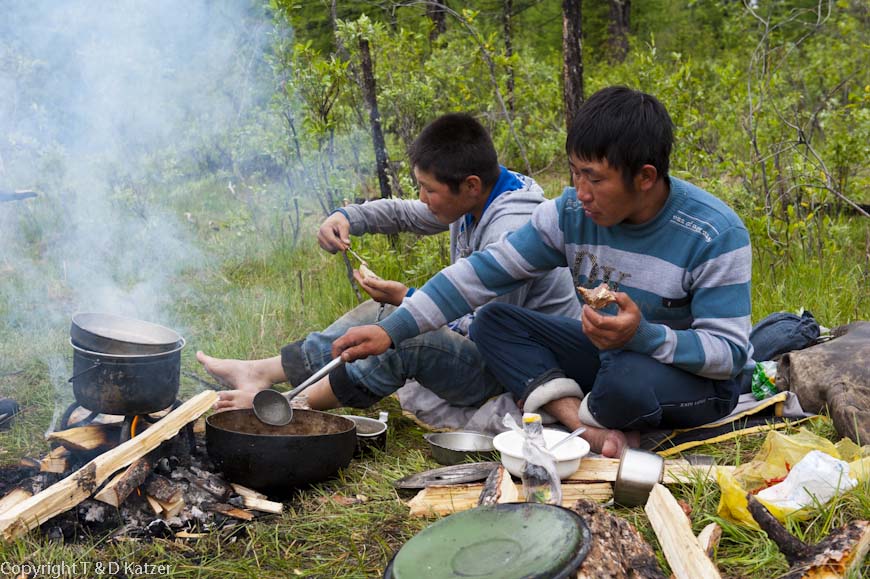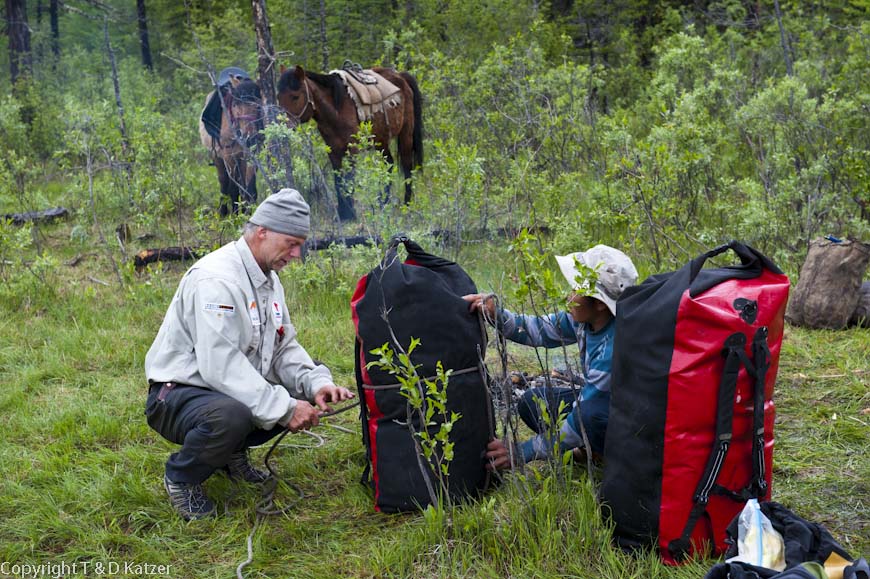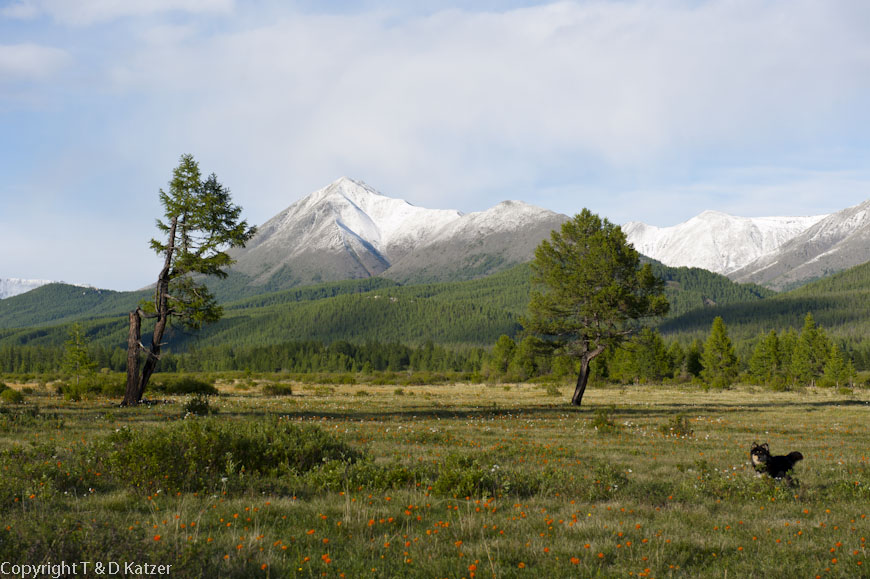
Only after the loss do we know what we care about him
N 51°05'061'' E 100°00'001''
Day: 335
Sunrise:
05:05
Sunset:
21:39
As the crow flies:
16,94
Daily kilometers:
20
Total kilometers:
1498
Soil condition:
Grass
Temperature – Day (maximum):
12 °C
Temperature – day (minimum):
8 °C
Temperature – Night:
2 °C
Latitude:
51°05’061”
Longitude:
100°00’001”
Maximum height:
1775 m above sea level
Time of departure:
13:30
Arrival time:
18:00






5:30 am. It has been raining non-stop again since yesterday afternoon. A small stream squeezes through under our sleeping mats, comes out again in the awning and forms a lake. The equipment is several centimeters deep in the water. The grass is muddy and swampy. I slip into my damp shoes and check on the horses. Naraa, Bor and Sar have become so entangled with their ropes around bushes that it is impossible for them to eat the fresh, juicy grass. Deliberately not getting annoyed about doing the job of our companions as usual, I free them and head back into the tent.
At 9 a.m. we slip out of our sleeping bags and wake up our horse men who are still in a deep sleep. They emerge from their fabric dwellings with crumpled faces. The constant rain continues to drench our camp with its unpleasant dampness. I look up at the sky. Heavy cloud formations are chased over the mountains by a strong mountain wind. Khurgaa starts to light a fire with wet wood. It takes a while, then the first delicate flames flicker out. As soon as the fire radiates some warmth, Bumbayr and he dry their wet clothes. In the meantime, it has stopped raining and their work seems to be crowned with success. “You mustn’t put your shoes on or you’ll have wet feet when you ride later,” little Bumbayr warns me, walking barefoot through the mountain water-soaked grass in these unpleasantly cool temperatures. As our shoes are water-repellent compared to the ancient boots from Bumbayr and Khurgaa, we keep them on. Shaking their heads, they register our ignorance and continue to walk through the camp, shivering from the cold. “I hope these greenhorns hold out and don’t catch a cold after just a few days,” I whisper to Tanja, who is standing next to me.
While I take down our tent, Khurgaa puts a pot full of water on three iron rods. These have a curved eyelet at one end through which a rope can be pulled to attach the horses. Because the ground is too wet and, according to Khurgaa, the horses would pull the earth hooks out of the ground, he has tied them to bushes. That is the reason why the iron stakes are still stuck in the fireplace. “Muu”, (bad) says Khurgaa with a serious face, pointing in the direction of the earth hooks on which we have been placing our pots for 1,500 kilometers of riding. “It’s not muu but sain (good),” says Tanja, justifying the tried and tested system. “But the pot wobbles and could fall into the fire.” “If you hammer the hooks evenly into the ground, nothing will wobble.” “Muu,” Khurgaa replies defiantly. “Well then, find some stones and put your pot on them,” Tanja suggests. As there is not a single stone for miles around in this narrow meadow valley, Khurgaa leaves his pot on the hook. “I wonder how long we’ll get along with the boys,” I say, putting the now folded tent into the bag provided.
“What a mess! Your Rantan has stolen our meat supplies, the bread and Boortsog,” complains Khurgaa. “What? How is that?” I ask, startled. “The rucksack with our food was in the awning,” explains Khurgaa. “You left your rucksack in the open awning all night?” “Tijmee.” “Although it’s unforgivable not to protect food better in the wilderness,” I say; “I’m very sorry about that. Are all the meat supplies gone?” “Ügüj. About half is stowed in the saddlebag. It was locked and is intact.” “Thank goodness,” I reply. “Oh Khurgaa?” I continue as the young man goes back to his soup. “Tijmee?” “Rantan is not our dog. He just joined us and has been following us since Tsagaan Nuur.” Khurgaa shrugs his shoulders and sits down next to the smoking fire. Then he chops a handful of rancid pieces of fat, dried, unappetizing-looking beef, our potatoes, carrots, some herbs and a stock cube into the pot and lets the concoction boil for a while. When the meal is ready, he invites us to join in. We gratefully accept. Although the soup, which tastes of old fat and is dripping, is not exactly to my taste, I praise his cooking skills. “Yes, I know. I’m a good cook,” he says confidently.
I have an unpleasant feeling of fullness as we load the horses with the luggage I have tied up after dinner. Since Khurgaa’s charging technology forced us to stop after just five kilometers yesterday, he doesn’t object. I am relieved to be dealing with someone who seems to have some insight.
We leave the damp camp at 13:30. The path is muddy and winds its way up the mountain. There is often a stream in our path which we cross unhindered. The horse’s legs stalk unsteadily through deep mire, over massive root networks and sometimes coarse rock. “A pedestrian would have a hard time here,” I say. “It would take the boots off his feet,” Tanja agrees.
The call of a moose booms like thunder through the dripping forest. Khurgaa and Bumbayr look up. “Is your dog a good hunter?” asks Khurgaa kindly. “The best. That’s why he has to wear a muzzle, otherwise he’ll kill every sheep and goat he comes across,” I explain. “Ha, ha, ha. That’s good. Then why don’t you free him from that stupid muzzle and let him roam the woods? Maybe he’ll catch us a wild boar?” he says. “Too dangerous. If he comes across sheep, we’ll have a big problem.” “There are no sheep or goats from here to Khatgal,” he says confidently. “There were some last year,” I reply. “Not this year,” he replies as if he knows this region and its nomadic inhabitants like the back of his hand. Although we are in a mountain range deserted by humans, we don’t trust the peace and leave Mogi’s bite inhibitor where it is.
After an hour we reach a wide valley. “We rode through this valley last year with Bilgee,” I say, puzzled. “Yes, I can remember the landscape,” Tanja confirms. “So Khurgaa is leading us back the way we came. I thought he was taking a shortcut?” I ask. “Who knows, maybe there’s no shortcut?” Tanja ponders. “Well, we wouldn’t have needed his local knowledge to go the old way.” “But it’s better to divide the night watches by four,” Tanja reminds me of the real reason why we are traveling with an escort.
“We should trot. Then we’ll make faster progress,” says Khurgaa. “Bor’s luggage won’t hold up on a trot,” I reply. “If we tie it up using my technique, it will hold,” he says with a grin. “All right then, let’s try again,” I admit defeat. Although two of the four bags slide precariously to one side after a short time, we actually make good progress and cover 20 kilometers in just 3 ½ hours.
By chance, we reach exactly the same camp site where we and Bilgee were forced to stay for a day eight months ago due to heavy snowfall. “It looks completely different here in summer,” says Tanja. “Yes, really peaceful. Can you still remember all those crossings of the half-frozen river?” “Of course I do. It was a tough but unforgettable trip.”
A light wind blows the cloud towers further and further apart. The sun’s rays are now burning through the widening gaps. Suddenly it is warm, almost hot. Our boys help unload and unsaddle the horses. The stakes are quickly hammered into the ground and the horses are tied to them. We work hand in hand. It looks like Khurgaa and Bumbayr will be an asset after all. We sit around the fire in a good mood. Khurgaa prepares his terrible-tasting stew again, smelling of old foot sweat. “Would you like some?” he asks kindly. “Thank you, I’m eating our own food today”, I say as my stomach rumbles alarmingly.
The food thief Rantan sits down next to the fireplace and waits eagerly to get some of the food. “You should call him Banker,” says Bumbayr. “Bankers? Why bankers?” I ask. “Because that’s a Mongolian name.” “No, his name is Rantan. That’s what we’ve been calling him for a week,” I reply. “Banker, come here!” Bumbayr calls out to him. But Rantan doesn’t react. “Come on Rantan!” I call to him and he sits down next to me, wagging his tail. “You see, he already answers to his name,” I say with a laugh. As soon as Rantan sits next to me, Mogi gets jealous and pounces on him like a wild fury. Because we have freed Mogi from his muzzle at camp, he takes the opportunity to have a horrible tussle with Rantan. The two males bite each other mercilessly until Rantan flees and takes refuge next to our tent. Tanja, who is still angry with the food thief and is worried that he might cause us problems on the way, shoos him away from the tent. Mogi sees this as confirmation and immediately resumes the fight. Rantan flees and is now 50 meters away from the camp. He looks over at us sadly. “I don’t think it’s good to drive Rantan away. He has chosen us as his family. There will be a reason for that. It doesn’t matter whether he causes problems or not. Rantan is our traveling companion. We should stand by him. Besides, for any horse thief, two dogs are more of a deterrent than one,’ I say. Tanja looks at me for a while. Then she replies; “I think you’re right. I’m sorry for scaring him away. We should adopt him and give him a collar. Then he’ll really belong to us. Bumbayr already seems to have taken him to his heart. Maybe he’ll take him with him when he and Khurgaa ride home again,” she ponders. Then she takes a cookie out of the bag and runs to Rantan to apologize to him in person. Rantan accepts the peace offer but no longer dares to enter the camp. As the sun sinks behind the mountains, Rantan is no longer to be seen. “Has he left us?” asks Tanja sadly. “I don’t know, but it looks like it. I think Mogi’s attack and our resentment after the food theft were too much for him. Maybe he’s now looking for new people who are nicer to him,” I think, saddened by an emotion that overcomes me. Khurgaa and Bumbayr also suddenly find the loss of Rantan painful. “It was a good dog,” says Khurgaa quietly. “What did you just say?” I ask, because I think I’ve misheard. “It was a good dog,” he repeats. “Sometimes we humans only appreciate the value of an object, a creature or a partner when we have lost it,” I conclude thoughtfully.
We look forward to your comments!

